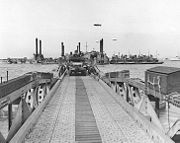
John Holmes Jellett
Encyclopedia

Doctor of Science
Doctor of Science , usually abbreviated Sc.D., D.Sc., S.D. or Dr.Sc., is an academic research degree awarded in a number of countries throughout the world. In some countries Doctor of Science is the name used for the standard doctorate in the sciences, elsewhere the Sc.D...
, MA
Master of Arts (postgraduate)
A Master of Arts from the Latin Magister Artium, is a type of Master's degree awarded by universities in many countries. The M.A. is usually contrasted with the M.S. or M.Sc. degrees...
(1905–1971) was a British
United Kingdom
The United Kingdom of Great Britain and Northern IrelandIn the United Kingdom and Dependencies, other languages have been officially recognised as legitimate autochthonous languages under the European Charter for Regional or Minority Languages...
civil engineer
Civil engineer
A civil engineer is a person who practices civil engineering; the application of planning, designing, constructing, maintaining, and operating infrastructures while protecting the public and environmental health, as well as improving existing infrastructures that have been neglected.Originally, a...
.
Jellett was appointed assistant civil engineer to the Admiralty
Admiralty
The Admiralty was formerly the authority in the Kingdom of England, and later in the United Kingdom, responsible for the command of the Royal Navy...
on 22 June 1933. He served in the Royal Navy Volunteer Reserve during the Second World War and was commissioned as a Temporary Captain
Captain (Royal Navy)
Captain is a senior officer rank of the Royal Navy. It ranks above Commander and below Commodore and has a NATO ranking code of OF-5. The rank is equivalent to a Colonel in the British Army or Royal Marines and to a Group Captain in the Royal Air Force. The rank of Group Captain is based on the...
. His engineering talents were called upon during the Invasion of Normandy where he was made Superintending Civil Engineer of Mulberry Harbour B
Mulberry harbour
A Mulberry harbour was a British type of temporary harbour developed in World War II to offload cargo on the beaches during the Allied invasion of Normandy....
, a temporary concrete harbour built at Arromanches. Mulberry B was in use for five months following the invasion and landed two million men, half a million vehicles and four million tons of supplies for the Liberation of Europe.
In recognition of Jellett's work with the Mulberry harbour he was appointed an Officer of the Order of the British Empire (military division) on 28 November 1944. His citation in the London Gazette
London Gazette
The London Gazette is one of the official journals of record of the British government, and the most important among such official journals in the United Kingdom, in which certain statutory notices are required to be published...
referred to his "distinguished service in operations which led to the successful landing of allied forces in Normandy". After the war he worked as a director of the Anglo Dutch Dredging Company at Beaconsfield
Beaconsfield
Beaconsfield is a market town and civil parish operating as a town council within the South Bucks district in Buckinghamshire, England. It lies northwest of Charing Cross in Central London, and south-east of the county town of Aylesbury...
, Buckinghamshire
Buckinghamshire
Buckinghamshire is a ceremonial and non-metropolitan home county in South East England. The county town is Aylesbury, the largest town in the ceremonial county is Milton Keynes and largest town in the non-metropolitan county is High Wycombe....
, a post he held from 1946 to 1966.
Jellett continued his service to the military by acting as an unpaid technical advisor to the army through membership of the Engineer and Railway Staff Corps, he was promoted to Major
Major
Major is a rank of commissioned officer, with corresponding ranks existing in almost every military in the world.When used unhyphenated, in conjunction with no other indicator of rank, the term refers to the rank just senior to that of an Army captain and just below the rank of lieutenant colonel. ...
of that corps on 3 July 1957. In 1966 he was elected a first class engineer member of the Smeatonian Society of Civil Engineers
Smeatonian Society of Civil Engineers
The Smeatonian Society of Civil Engineers was founded in 1771, and was originally known as the Society of Civil Engineers, being renamed following its founder's death...
. Jellett served as president of the Institution of Civil Engineers
Institution of Civil Engineers
Founded on 2 January 1818, the Institution of Civil Engineers is an independent professional association, based in central London, representing civil engineering. Like its early membership, the majority of its current members are British engineers, but it also has members in more than 150...
from November 1968 to November 1969. He authored the Harbours and Sea Works article entry in Encyclopaedia Britannica. By 1971 he was living in Southampton
Southampton
Southampton is the largest city in the county of Hampshire on the south coast of England, and is situated south-west of London and north-west of Portsmouth. Southampton is a major port and the closest city to the New Forest...
in Hampshire
Hampshire
Hampshire is a county on the southern coast of England in the United Kingdom. The county town of Hampshire is Winchester, a historic cathedral city that was once the capital of England. Hampshire is notable for housing the original birthplaces of the Royal Navy, British Army, and Royal Air Force...
, dying later that year.

